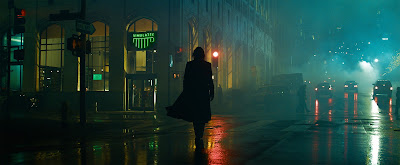"You're flying out to darkness to fight a ghost."
- Otto Octavious
The level of
wokeness – identity politics – and SJW shit that wasn’t present in this movie
is its own post-logic miracle. This movie was about people – all people –
whomever you may be – to come and enjoy an action-adventure film without being
torpedoed with – confabulating ideologies forced into a mosaic of fabricated far-leftist multiculturalism.
Spider-Man: No Way Home was about growing up and leaving yourself out of the outcome if that outcome for the group is better off without you in it. The truth is we don’t always get our way – we don’t always get what we want – we are often left out – we are often left alone. The flipside is – we – grow. We learn to navigate, we learn to assign meaning, within ourselves, to what is meaningful about the relationships and the world that is all around us.
The Spider-Boy becomes a Spider-Man.
Spoilers ahead……..
To proceed forward assume your spider senses are
tingling.
Matt Murdock
– Daredevil. This was exciting to see
that Charlie Cox’s Netflix Daredevil character was loved enough by fans that
Marvel saw fit to put him into the MCU movies.
He will add a great deal of, and much needed, maturity to upcoming MCU
movies.
No Way Home
juggled all the previous Spider-verse villains seamlessly and then comes
Andrew’s Amazing Spider-Man and then Tobey’s Spider-Man to add icing on the
cake that I haven’t seen at the movies in a long time, nostalgically speaking. There are still a lot of questions, but this
was a calculated but convoluted movie with many moving parts, even for complex subject matter that surrounds the Multiverse and String-Theory.
Speaking of - Question: Does the other Peter’s, Tobey and Andrew, in their respective universes have all their loved ones who know they are Spider-man, forget them as well?
Electro –
Jamie Foxx got to not be so blue. His Electro
thankfully stayed true to the comic book character and was electricity yellow
whenever he blasted lightning from his hands.
Green Goblin
– William Defoe killed it in every scene.
Spoiler friendly spoiler hahahahaha.
He didn’t skip a beat from 2002’s Spider-Man and still looks great.
Dr. Ock - Alfred Molina was great once again as the multi-tentacled villain. He's always been the voice of reason as long as he is in control of his cybernetic technology and not the other way around.
So much
spectacle, so much fan service, so much awesomeness. Spider-Man: No Way Home was a fun movie to
watch from start to finish – and that’s it, that’s all I have to say, but…. It
turns out it isn’t – there’s a little more.
The movie is so much more than its moving mechanical tentacles… I mean
parts.
"The problem is you trying to live two different lives. The longer you do it the more dangerous it becomes."
- Dr. Strange
Dr. Strange performed a spell, by Peter’s request, to magically disappear anyone’s memory of Peter Parker being Spider-Man through a sort of magical Mandela Effect – which at this point the whole world knows who Spider-Man’s identity is.
I do think that Strange’s eagerness to help Peter with this spell despite its dire consequences may have less to do with this movie and more to do with the Dr. Strange upcoming sequel. Some questions – I guess we wait and see.
Spider-Man:
No Way Home was the best Marvel movie I’ve seen in years. It was respectful of what came before it. It didn’t come off selfish or even jealous of
the earlier Spider-Man movies. Instead,
it chose to celebrate them with actual class. The film had real stakes where Peter had to make choices with consequences, some with unfortunate outcomes. The No Way Home in the title could certainly be toward the villains and Andrew and Toby's Spider-Men, but No Way Home is really about how the MCU's Spider-Man was never going backward where he could seek comfort at his home.
This movie showed that Tom Holland's Peter Parker wasn't actually Spider-Man until the end of this film. By the end, when he puts on the new suit that he made, and after taking full responsibility for his previous actions, only then do we truly see our friendly neighborhood Spider-Man.
With Great Power Comes Great Responsibility











